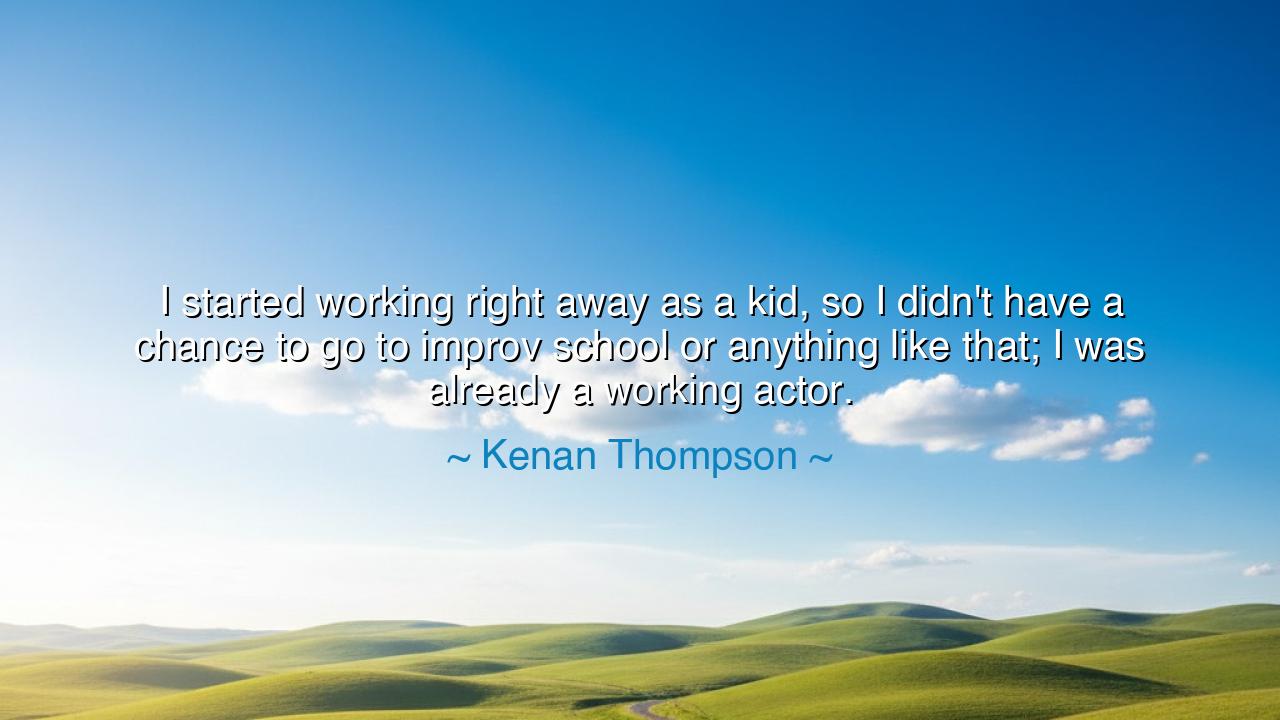
I started working right away as a kid, so I didn't have a chance
I started working right away as a kid, so I didn't have a chance to go to improv school or anything like that; I was already a working actor.






In the words of Kenan Thompson, "I started working right away as a kid, so I didn't have a chance to go to improv school or anything like that; I was already a working actor," we are reminded of the importance of opportunity and experience in shaping the course of a person’s life. Thompson’s journey is not one marked by traditional training or preparation, but by a chance encounter with the world of acting that allowed him to grow on the job. His words speak to a universal truth—that life does not always follow a prescribed path, and sometimes the best lessons are learned not in the classroom, but in the real-world experiences that demand our immediate action.
In the ancient world, the greatest heroes and thinkers did not always have the luxury of formal education, yet they thrived through experience and trial. Socrates, for example, never wrote down his teachings, nor did he follow a traditional educational route. His wisdom came not from books, but from engaging with the world around him, asking questions, and learning through dialogue. In much the same way, Thompson’s growth as an actor was not shaped by formal schooling, but by the real-time experiences he gained by being immersed in the craft. He learned not by sitting in a classroom, but by doing, engaging in the work, and adapting as he went along. This reflects an ancient principle: growth comes from action, and sometimes the most powerful lessons are those learned through experience rather than theory.
The value of experience over formal training is also evident in the story of Leonidas, the Spartan king. Known for his legendary leadership at the Battle of Thermopylae, Leonidas was not simply trained by scholars or advisors, but by the harsh conditions of his life and the brutal discipline of the Spartan agoge. From a young age, he was thrust into an environment that demanded strength, strategy, and courage—traits that were cultivated not through books, but through the experiential training of daily life. Thompson’s journey, though in a different realm, echoes this philosophy: true mastery is born from the challenges and opportunities presented to us in the world, not always from structured lessons.
Thompson’s quote speaks to the power of self-reliance—the idea that one does not always need formal institutions to achieve greatness. The ancient Romans often celebrated those who were able to rise through merit and perseverance, rather than through noble birth or traditional education. Take, for example, Cincinnatus, the Roman statesman who, despite his lack of formal education in the ways of politics, became a model of virtue and selflessness. Cincinnatus was summoned to serve as dictator during a time of crisis, and when his task was completed, he gave up his power and returned to his farm. His rise was not due to school or privilege, but to his ability to act when the opportunity arose. Likewise, Thompson’s success as an actor came from his willingness to seize opportunities early in life, learning and adapting through hands-on experience.
In life, formal training is often seen as the path to success, but Thompson’s journey teaches us that opportunity and adaptability can be just as valuable. While it is important to have a foundation of knowledge, it is through real-world experiences that we often come to truly understand our craft and develop our skills. David Bowie, for instance, did not follow a conventional musical path, but rather experimented with different genres and styles, constantly adapting his approach to create something new and groundbreaking. This flexibility, this willingness to learn through doing, is what allowed Bowie to become one of the most influential musicians of all time. Similarly, Thompson’s success is a testament to the power of seizing the moment and learning by immersing oneself in the work, rather than waiting for the "perfect" conditions.
The lesson we take from Kenan Thompson's words is a reminder that success does not always require a perfect set of circumstances or a traditional route. Life often presents opportunities that are unexpected and unstructured, and we must be ready to act when those moments arise. Whether we are pursuing a career, a passion, or personal growth, the ability to learn through experience and to adapt on the fly is crucial. Just as Thompson’s acting career was shaped by the moments he seized, so too must we embrace the opportunities presented to us, recognizing that sometimes the most valuable education comes from doing, not from waiting for the ideal conditions to appear.
In our own lives, we must ask ourselves: When opportunities arise, am I ready to seize them, even without all the formal training or preparation? Life is not always about following a set curriculum—it is about embracing experience, learning from each moment, and growing through action. Like Thompson, we can create success not by waiting for everything to align perfectly, but by stepping forward with courage, adaptability, and a willingness to learn through the challenges and opportunities that come our way. Through experience we find wisdom, and through action, we find the path to mastery.






AAdministratorAdministrator
Welcome, honored guests. Please leave a comment, we will respond soon